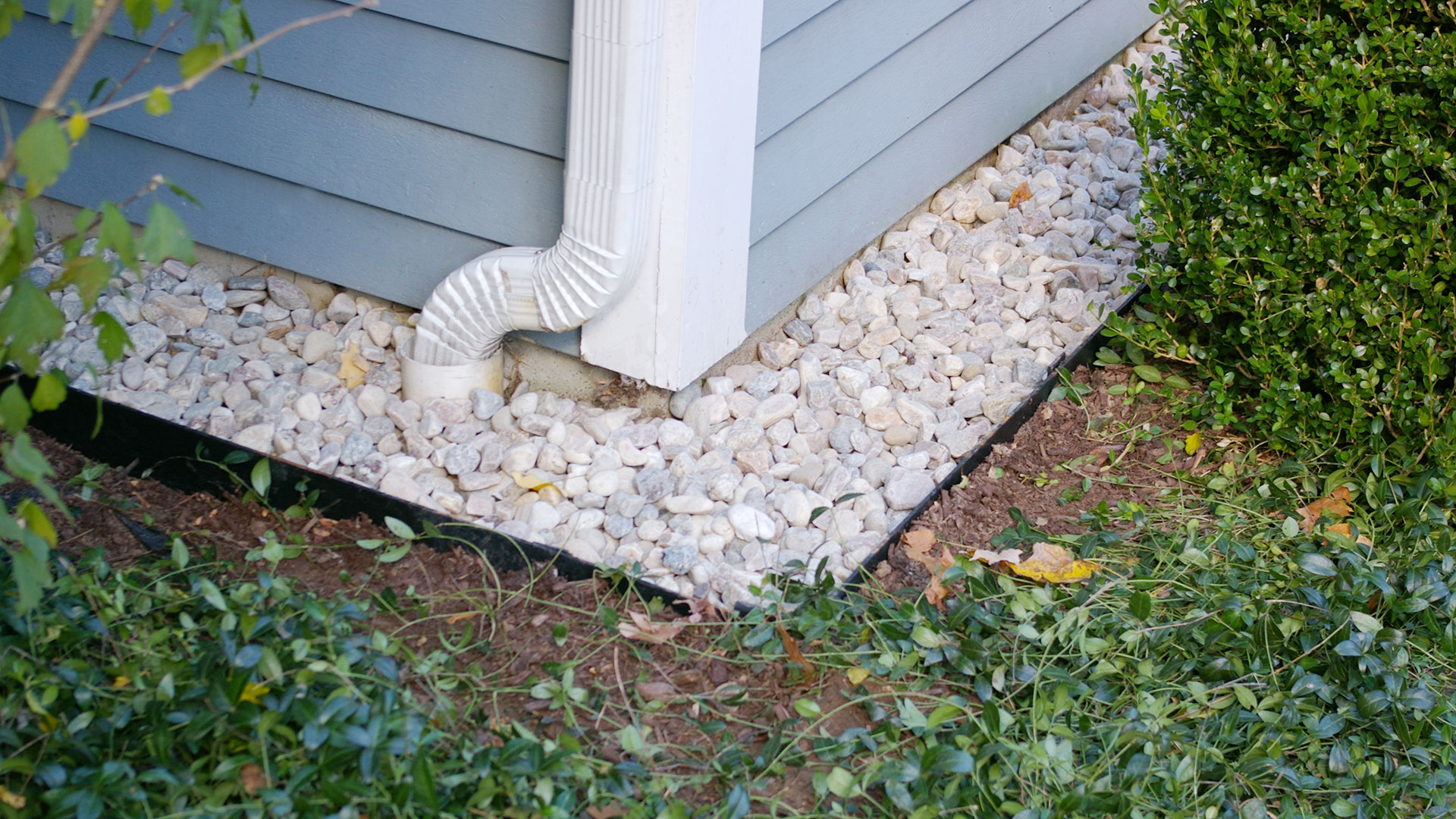A drip edge is a trench filled with gravel that prevents mud from splashing against your home. You install it where water drips off the roof. I also use a drip edge when the grade next to the house is the same level as the siding.
Install the drip edge one foot from the siding when controlling a grade and a little outside the drip line of a home when controlling splashing water.
If your grade is level with the siding install a drip edge level with the mulch. Leave a 1-2″ gap from the top of the edging to keep mulch from touching the siding.

Use commercial grade metal edging for drip edges. No rolled plastic from a box store. It comes in 1/8″ and 3/16″ widths that are 4″ tall and 10′ or 16′ long. This is heavy-duty stuff. If you have tight curves go with the thinner metal. There are fitting available for the edging for corners and splices to make the job look more professional.
Fill your trench with a minimum of 1″ diameter gravel. Gravel smaller than 1″ blows out of the trench when cleaning up leaves. The gravel also blocks sunlight and preventing weeds.



I use gravel with earthy tones that blends with the landscape. A river stone with rounded edges works nicely too. The choice is yours.
I don’t use weed fabric under the gravel. Weed fabric traps sediment and the gravel will soon be sprouting weeds. Not using fabric also makes the stone easier to remove should the need arise.

Apply black spray paint where you cut the edging to prevent rust. I use a Milwaukee Portaband to cut edging. A hacksaw, some elbow grease and a lot of patience works just as well.
Time spent installing a drip edge will keep you from having to replace siding, or worse, down the road.
By John Holden

Comments
5 responses to “Keep Dirt and Mulch Off Your Siding”
I have a project for a client where the siding is almost below grade. The client whats pavers there. I think I can use this there what do you think?
Metal edging would be the perfect solution for your client. You can see how high the mulch was on the siding by where the siding wasn’t painted. Be sure to get a quality metal edging material and avoid rolled plastic.
John, we just bought a home with new siding (I’m sure the old siding was very dirty). The dirt is level, and in some places above, the siding. Of course, every rain, the siding looks a mess, and the dirt travels pretty high up the siding.
How wide can I make the drip edge to ensure the dirt/mud stays off of the siding? I am thinking two feet, but I wanted you opinion. Also, will this diver more water toward the foundation of the house?
I am also thinking about digging a little deeper and installing a french drain system around part of the house to divert water away from the foundation. Hopefully, I can install the french drain and drip edge all at once.
Thanks for any insight.
–Eric
It depends on the grade around the house. If the grade slopes away from the house you are fine but if the grade slopes toward the house the drip edge will end up catching water. I prefer to not install drains right against the foundation of the house. If something goes wrong there’s no second line of defense. I raise the grade in my beds so they gently slope away from the house and no additional drainage is needed. If you have a lot of water additional drainage can be installed away from the house. I’m sure there are other ways to do it but that’s how I do it.
I just found this blog and have had the same issues. We have a courtyard covered in gravel and siding and sheathing go below grade. No concrete foundation to speak of on the garage on this 1928 lake cottage. We excavated below grade and found alot of rot on the sheathing which we cut and replaced with special plywood approved for on grade use.
The previous attempt to prevent water infiltration was concrete pavers set vertically against the house. It didn’t work apparently by the extent of the rot. I did come up with the edging with white marble chips, Unfortunately I didn’t install it past the roof drip line and the splash back is still occurring.
A gutter on that portion of the garage area would solve the issue, not sure if that is the route to go, or to redo the drip edge.
I have photos, would like to post.